Climate Action
What Does NYC Climate Week Teach Us About COP29?
November 12, 2024

Terran Fielder, Media Specialist, EARTHDAY.ORG
WHAT DOES NYC CLIMATE WEEK TEACH US ABOUT COP 29?
With Cop 29 starting on November 11th, there’s a sense in the air – do these BIG climate events really matter? Do they make a difference, what can you learn or who can you influence by attending?
Well here’s a snap-shot of my very first New York Climate Week which happened in late September, to hopefully convince you that talking matters and attending these ‘gatherings’ is a critically important part of the conversation when it comes to climate change. A conversation that will lead to adaptation and progress. I certainly felt energized by my week in New York. So, here’s a run-down of what I got up to!
Unofficial Day 1: Sunday Sept 22, 2024
WEATHER: Hot & Humid
MOOD: Happy to be heading into NYC Climate Week, finally!
Sarah Davies, our Director Communication & Media, headed into town early to catch up with a journalist from the UK who has done some of the best coverage out there on plastics, human health and how it affects the people of the Global South more than anywhere else.
There’s a few events this week dedicated to plastics and human health and a TON of renewable energy, so we have a lot of ground to cover. Especially given that the Theme for Earth Day 2024 is Planet vs. Plastics and the newly announced Theme for 2025 is Our Power, Our Planet, calling for a tripling of renewable energy generation by 2030. Climate Week is the perfect synergy of both!
DAY 1: Monday Sept 23
WEATHER: Hot & Humid
MOOD: There is a definite buzz in the air

Terran at the first day of NYULH Plastics Symposium
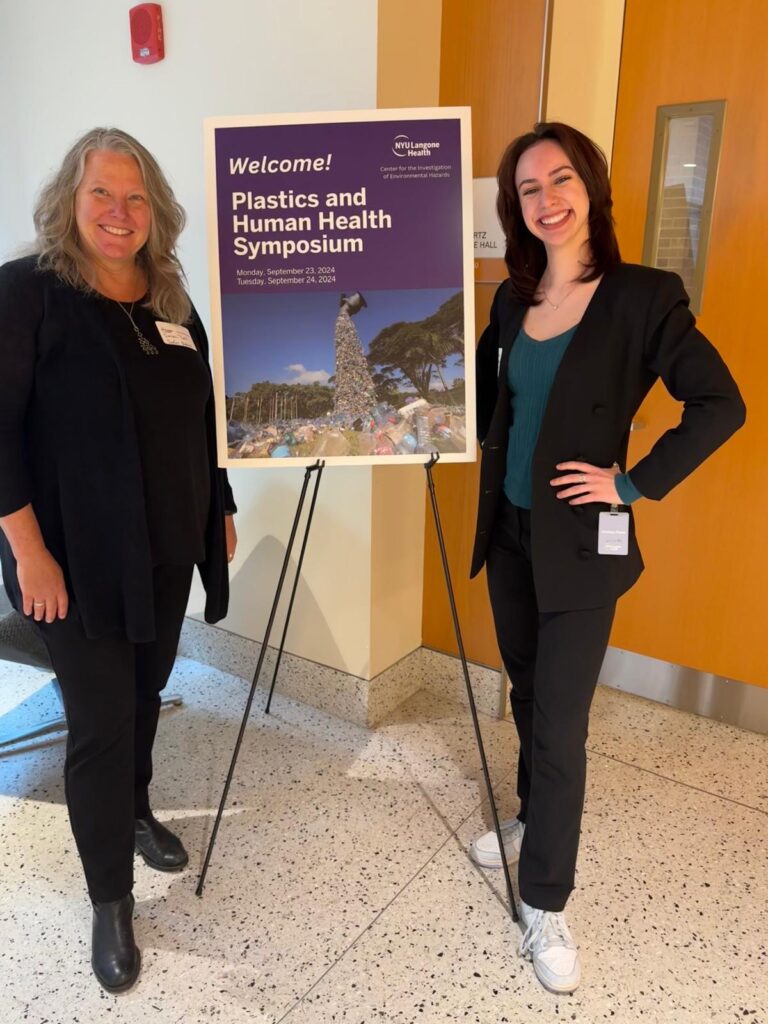
Meeting Sarah Doll, National Director of Safer States at the Symposium

Bryce Coon, EDO’s Director of Education & Aidan Charron, Associate Director, Earth Day fuelling up!
I arrived in NYC from DC late last night, to make sure I got to the NYULH, ‘Plastics and Human Health Symposium’ event on time. It was an all day affair and featured a ton of incredible experts and panels presenting the latest research on the impact of plastics, microplastics and their toxic chemicals on human health.
It was a shame Elon Musk couldn’t be here given how he recently, and wrongly, dismissed plastics as NOT being a human health issue. Anyway, I was glad I came into town the night before as my check-in began promptly at 8am.
8:50AM: Senator Whitehouse zooms in to give his opening remarks: The petrochemical industry has been lying to us. Plastic recycling is a fraud. “We obediently take our plastics to the blue bin, then almost none of it actually gets recycled,” said Senator Whitehouse.
9:00 AM: Chief of Pediatrics Service Mona Rigaud or Chair did a great opening about how plastics are detrimental to children’s health as they are endocrine disruptors. She pointed out that the petrochemical industry is constantly talking about the jobs that would be lost if we phased out plastics, yet they conveniently neglect to mention the $340 billion annually that US taxpayers alone spend on dealing with the health issues caused by plastics. That shocked me.
Dr. Pete Meyers, was next up. Famous scientist and major campaigner in the plastic space. Meyers shared a personal experience – he explained that after 2018, the devastating California Paradise Fires consumed everything in their path, including a lot of plastics from homes, offices, shops and cars. The toxic fumes reached the Bay Area, where his pregnant daughter was living. She gave birth prematurely.
The most likely suspect for triggering this being the airborne toxins from the burning plastics. In a cruel irony, he noted that plastics were everywhere in the NICU, surrounding the fragile life the medical teams were fighting to save—the same plastics that had nearly cost her that life. Meyer’s story left us all with a haunting question: are the temporary solutions plastics provide worth the profound risks they pose to our health?
Well the rest of the day kind of answered that – here’s a snap-shot of some of the take outs from the other speakers whose work especially stood out to me:
Dr. Bethanie Carney Almroth – Professor and Researcher of Ecotoxicology at University of Gothenburg: We’ve introduced 350,000 chemicals into our environment, yet we only understand the effects of 65. 65!!! Basically we’ve been treating the Earth like a giant experimental trash can.
RECYCLING IS A LIE! Speakers came together after their presentations for a panel discussion, highlighting the hidden dangers of recycling. Not only does it give consumers the idea that they can make a meaningful difference, but it also poses serious risks. Why? Well plastics absorb harmful chemicals, and when these materials are recycled, they can become even more hazardous.
I would love to say this was all news to me but it isn’t! It did get me fired up to keep spreading the word that recycling plastics is NOT the solution – capping plastic production is and finding alternatives!!
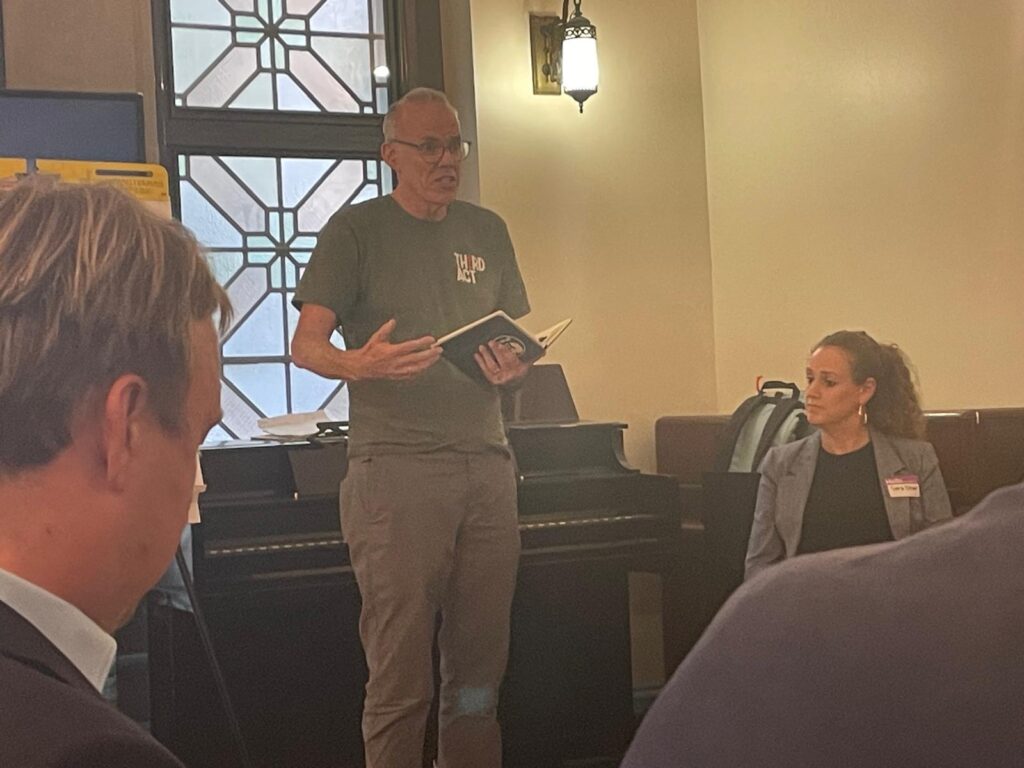
Terran at the first day of NYULH Plastics Symposium
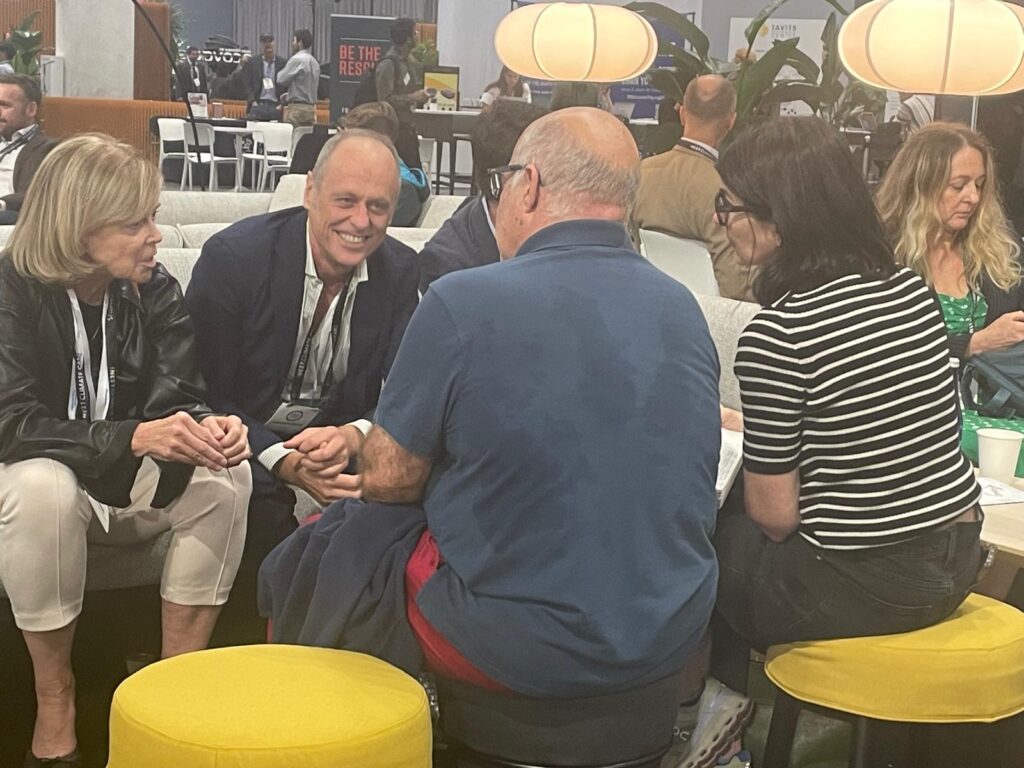
Kathleen leads the climate education team discussing NDC’s with some great partners
While I was soaking in the bad news on plastic recycling Sarah was across town listening to environmentalist Bill McKibbon talking to a room of activists, in support of renewables. Lots of positive energy in the room but also some indigenous groups wanted to stress that renewables needs to be managed with collaboration and sensitivity.
There are fears that the global north will take whatever resources it needs from the global south to make clean energy feasible, lithium, silver and land for example, with little consideration for those nation’s people, biodiversity and the environment. They don’t want renewables to have the same attitude as the fossil fuel companies before them.
5:00pm: Director’s Guild Theatre, on 57th, for the screening of the new documentary “The White House Effect”
Hollywood Climate Summit
Sarah and I met up at the DGA Theatre for the The Whitehouse Effect Screening: This is a truly gripping documentary that unpacked how Bush (Sr.) entered the White House claiming he was a pro-environmental president bit left it having pretty much completely conceded to the fossil fuel industry and their narrative that climate change is debatable. It isn’t. It was truly mind blowing and I urge you to visit the film’s website, go see it and follow their IG @thewhitehouseffect.
At the very end of the documentary, and completely by surprise as it was not advertised, the film-makers welcomed onto the stage former Vice President, Al Gore. Party politics aside he is a pivotal figure in the climate change movement and he received a warm reception.
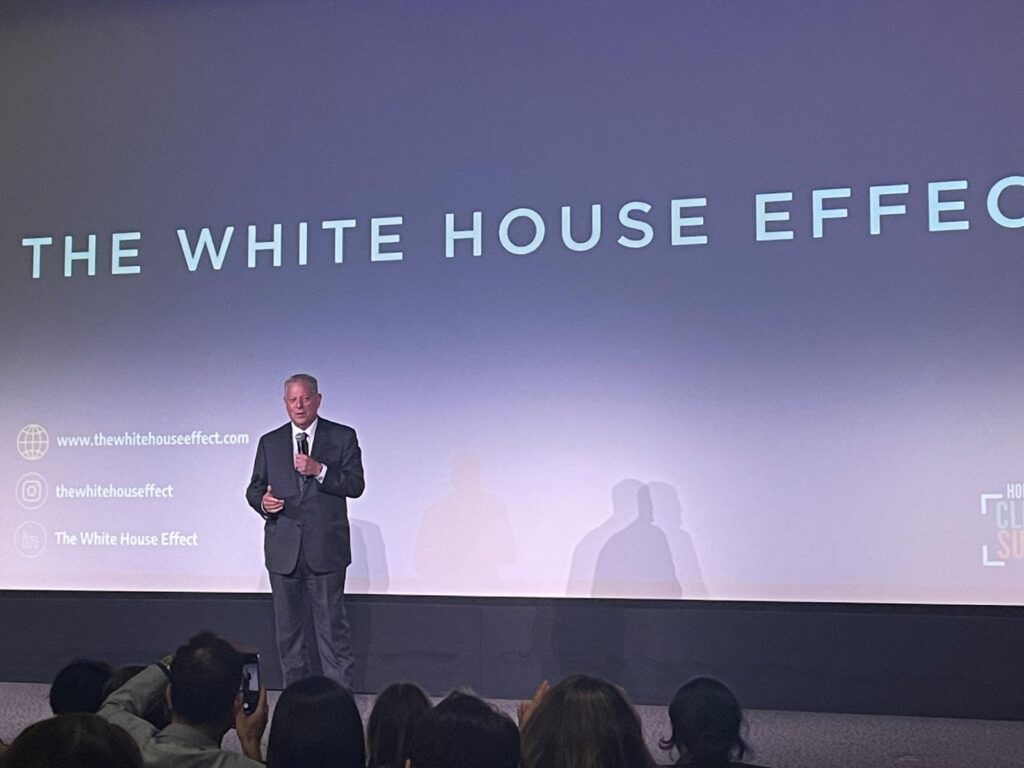
Al Gore speaks at the Hollywood Climate Summit
DAY 2: Tuesday Sept 24
WEATHER: Cool but very humid
MOOD: There’s a palpable energy in the room as everyone is eager to build on yesterday’s insights and put them into practice.
NYULH Presents: Plastics and Health Symposium Day 2:
10:00AM: The big question of the day: how do we translate science into legislation?
10:15AM: California Attorney General Rob Bonta starts us off with remarks on exposing Exxon. Attorney General Bonta’s landmark lawsuit against Exxon exposes their lies about the environmental impact of petrochemicals. Yesterday’s buzz has turned into today’s call for justice. Only about 5% of plastics are recycled in the U.S., but the industry spends millions to convince the public it’s our responsibility. Bonta criticized Exxon for creating misleading sustainability campaigns while continuing harmful practices. “Exxon has lied to the world to fatten their wallets,” said Bonta.
His message is clear: accountability is coming.
10:35AM: Speakers, speakers, and more speakers! Dr. Jane Muncke – Managing Director of Food Packaging Forum, knows all about food packaging and told us all about it. Over half of our food is packaged, and 69% of that packaging is plastic. When our food touches plastic, chemicals seep into the food and 76 of which are known carcinogens. The FDA’s safety standards? Surprisingly low. They rely on “competent scientists” to decide what’s harmful, leaving us wondering: who are these ‘competent’ experts if not in this very room.
1:30PM: Post-lunch panel with Kaelah Smith – Connecticut Assistant Attorney General, Sarah Doll – National Director of Safer States, Mike Belliveau – Founder of Bend the Curve, and Joe Laakso – Endocrine Society
This panel brought together experts working to bridge the gap between research and legislation. Sarah Doll emphasized, “We have to make sure science is understood by everyone, especially legislators.”
Across town our newest member of staff, Aminah Taariq-Sidibe, our Manager of the End Plastics Campaign, tuned into an event hosted by Systemic Justice, Tortoise Madia and Greenpeace, Netherlands. The topic of conversation; the power of innovation and technology to achieve net-zero: Whose planet? podcast – centering Black, Indigenous and People of Colour perspectives in climate justice

Esther Whiedon (ESG), Kathleen Rogers, (EDO) & Frank Niepold (NOAA)
Meanwhile Kathleen Rogers, EDO’s President and Frank Niepold, from the National Oceanic and Atmospheric Administration (NOAA) were over at the bustling NEST Climate Campus, to record a joint interview with the supersmart Esther Whieldon, a senior writer and Co-host of ESG Insider podcast. Their episode was titled “Why climate literacy matters for business, growing the green workforce” and it’s available on Spotify, Apple Podcasts, YouTube Music, YouTube and the S&P Global podcast page.
4:60PM
Afterwards we mingled with members of the climate education and energy sector, sharing developments and our plans. You realize that there’s a huge benefit in being on the ground, speaking face to face, if you can, is the gold standard of communication.
We get to listen to other points of view and share contacts, and frankly make friends with our colleagues.

Cheese! Terran and Sarah at the NEST Climate Campus Main Stage
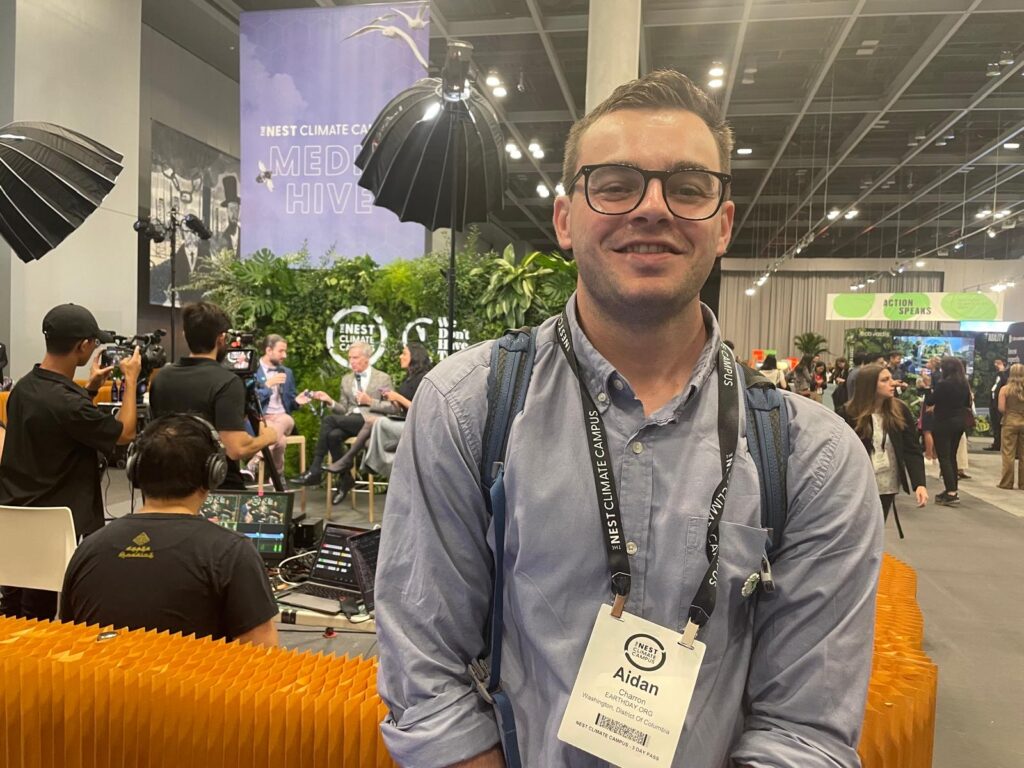
Aidan Charron, Associate Global Director, if you look carefully Bill Nye the Science Guy is behind him being interviewed by Sweta Chakraborty, from the wonderful – We Don’t Have Time
6:30PM
Kathleen Rogers doesn’t stop – she was interviewed with Manuel Pulgar Vidal – the Global Leader of the World Wildlife Fund, by the team at We Don’t Have Time. Manuel is as smart as he is gracious.
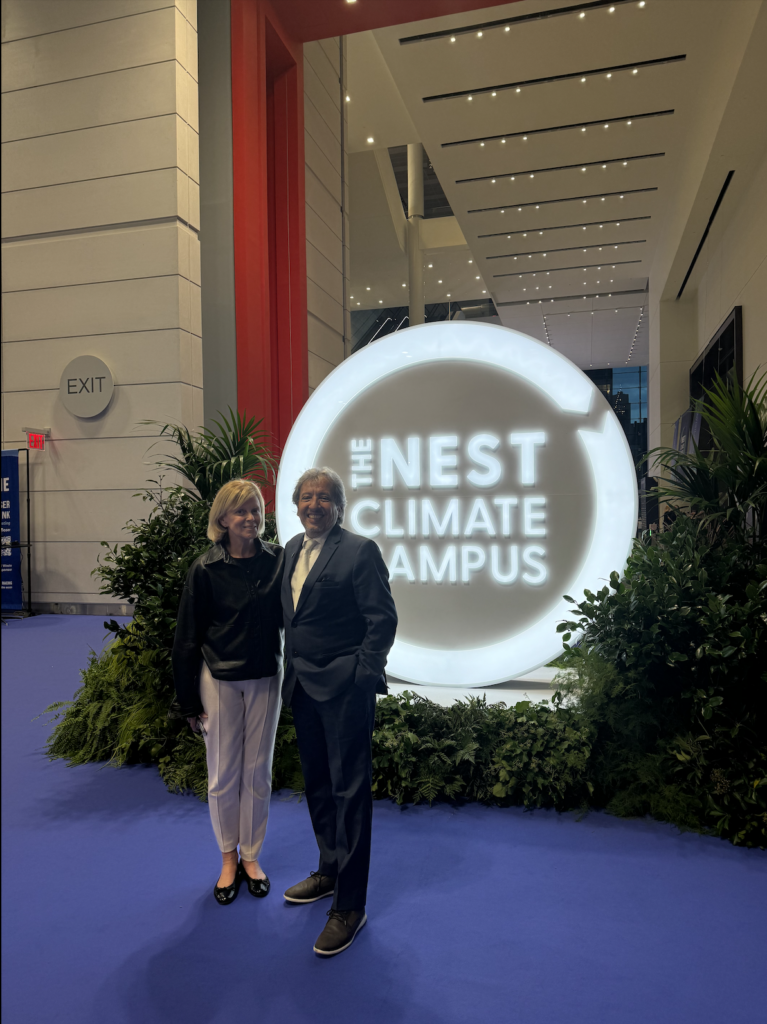

Kathleen Rogers and Manuel Pulgar Vidal, Global Leader of the World Wildlife Fund, after a successful interview at the NEST Media Hive, with ‘We Don’t Have Time’

Full disclosure this is Aminah (middle) at Climate Week NYC’s Official Pre-Event Social with Swissnex on September 19th. But I love the photo!
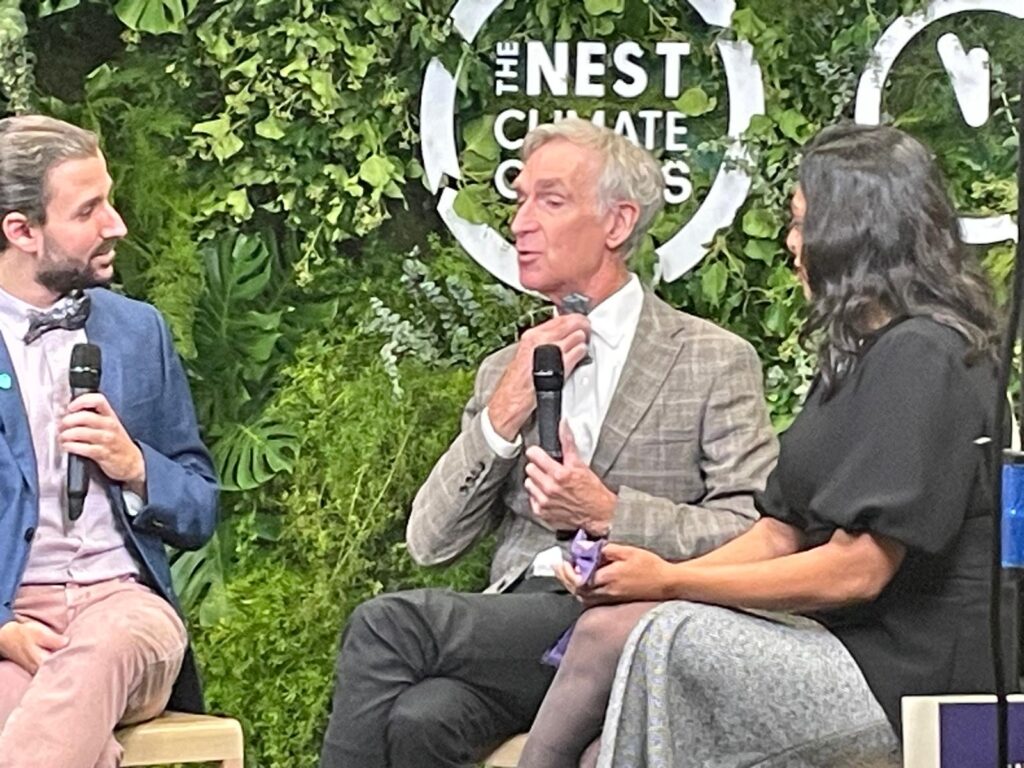
TV host Bill Nye in action in the Nest’s Media Hive, wearing his signature bow tie!
DAY 3: Wednesday Sept 25
WEATHER: Cool, Fall is Upon Us!
MOOD: Thrilled to pivot my focus from plastics to the world of renewable energy!
Breakfast meetings with a ton of great new contacts and communications experts, Bloomberg hosted an amazing event that took up the entire morning in a wonderful way! I really enjoyed some of these sessions but one speaker stood out:
Dr. Beverly Wright – Deep South Center for Environmental Justice : Dr. Wright shared that she’s been working for decades in front line communities without seeing progress. Her community gets sicker while petrochemical’s wallets get fatter. She was impassioned and frankly angry that nothing has changed and she feels nobody is listening. It was moving and exasperating all at the same time as not being heard is exhausting. Went and said ‘hi’ and asked how we can work together.
Actress Jane Fonda was in the audience and heard Beverly and was moved to speak. She leapt from her seat to give an impromptu speech about petrochemical pollution, but added, “…basically we need more power. We need to empower people on the front lines… We need to elect climate champions who understand what the plastics and chemicals are doing to us.” Vote!
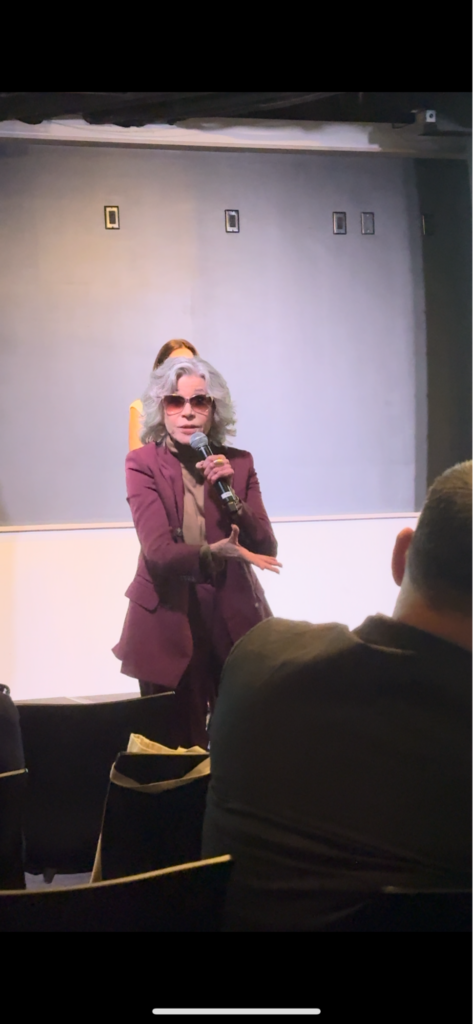
TV host Bill Nye in action in the Nest’s Media Hive, wearing his signature bow tie!
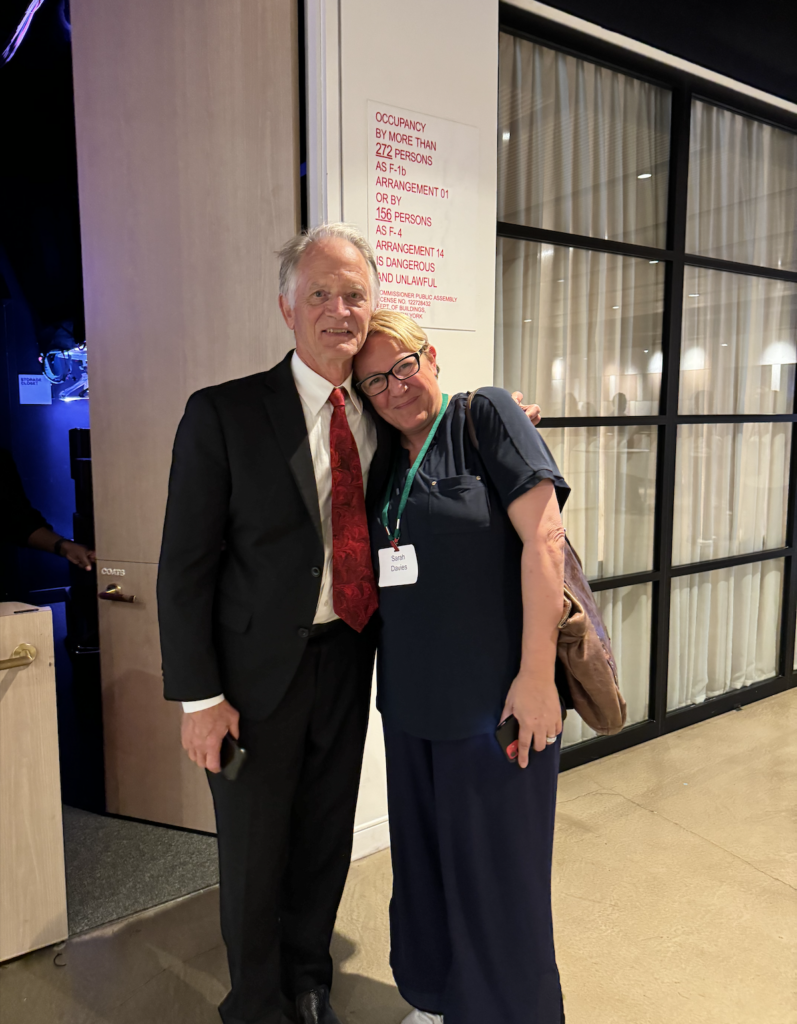
Dr. Pete Meyers, Founder of Sudoc, being ‘fan-girled’ by Sarah Davies
